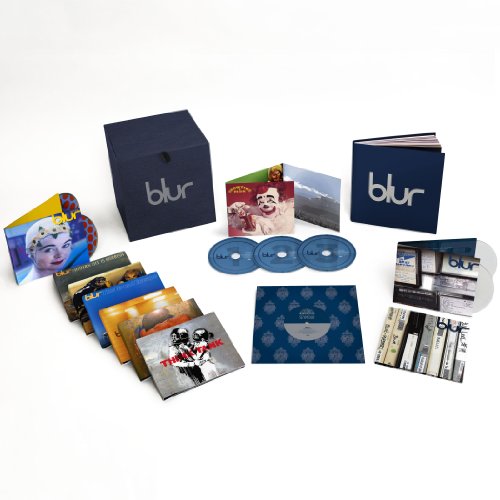
Blur
Blur 21
Release Date: Jul 31, 2012
Genre(s): Britpop, Pop/Rock
Record label: Parlophone
Music Critic Score
How the Music Critic Score works
Album Review: Blur 21 by Blur
Fantastic, Based on 9 Critics
Based on rating 9.5/10
It's been 21 years since Blur released its debut, 1991's Leisure, an album that picked up where The Stone Roses left off and represented the first step in a career that both defined and shaped what we know as Britpop. With this anniversary of sorts, the band decided it was a great time for a career-spanning box set. Though familiar foes and Britpop contemporaries Oasis made a bigger splash in the States, Blur possessed a much greater and better variety of pop proficiency through its career.
Based on rating 9/10
What makes Blur 21 something more than just fan bait -- although, make no mistake about it, there needs to be a certain level of dedication to get through a box of this size -- is that there is an actual narrative told here, one that not only tells the story of Blur but represents the trajectory of British indie music in the '90s. At the outset, Blur were a noisy, confused amalgam of droning psychedelia, C-86 pop, and Madchester dance, their various influences gaining focus on their 1993 second album, Modern Life Is Rubbish, designed by lead singer/songwriter Damon Albarn as a defiant response to the insurgent grunge from the U. S.
Based on rating 9/10
Blur has been a scrappy band from day one. They were, at one point, the biggest act in the UK, but they both struggled to get there and struggled to keep it. When they put out their first album, 1991’s Leisure, they were working in a post-Stone Roses landscape and trying to distance themselves from other pop acts. They would have to battle with the onset of Grunge and getting overshadowed by the likes of Suede.
Based on rating 8.9/10
Here’s the thing: Nobody who is ambivalent about a band is going to shell out $150 or more for a comprehensive, omnibus collection of that band’s work. A greatest hits will do fine, thank you very much. So approaching Blur 21 with any sort of critical eye toward its musical content is somewhat foolish. If you love Blur a whole lot, you’re already considering buying this.
Based on rating 8.5/10
Choose Damon. Choose Graham. Choose Damien Hirst's cheekily agit-pop country house or Sophie Muller's teen-spirit-stinking squat. Go pop, then spend a decade slowly deflating; study the songbook so you can tear it up with precision. Choose irony, choose sincerity. Choose your own worst NME: a ….
Based on rating 4/5
There's something oddly final about lavish CD box sets. Their completeness seems to say: "This is it." Those curious about Blur's future – already gloomy at the news that they've apparently abandoned a new album, and at the elegiac quality of their recent new song, the beautiful Under the Westway – might be forgiven for heaving a sigh at the arrival of 21, which collects virtually every note Blur have released with four CDs of stuff they previously hadn't. Certainly, 21 is exhaustive, almost to a fault.
Opinion: Fantastic
First up though, the facts. 21 signifies 21 years since the release of first album Leisure. It contains all seven proper albums – Leisure, Modern Life Is Rubbish, Parklife, The Great Escape, Blur, 13 and Think Tank – now in long overdue deluxe editions with additional B-sides and odds and sods from each period. There's another four discs containing even rarer stuff dug out of boxes from the band members' lofts.
Opinion: Fantastic
A glorious collection, placing Blur firmly amongst the very best bands of all time. Ian Wade 2012 Blur. They barged into indie just as the baggy dream dissolved nastily, rising triumphant against both the oiks of Oasis and the dandies of Suede. Exhibiting a Bowie-like restless creativity, the band expressed ideas enough to conjure parallels with Dinosaur Jr, The Kinks, Tony Allen, Scott Walker and more.
Opinion: Fantastic
Not only was Blur four albums and a jukebox full of singles into its career by the time Oasis dropped Definitely Maybe and (What's the Story) Morning Glory? in the span of 15 months during 1994/1995, but the aforementioned London quartet had already morphed successfully from a late-Eighties collegiate band. Nevertheless, the eternally belligerent Gallagher simians saw their brute foursome crowned as Britpop's Beatles, while the longevity of Damon Albarn, Graham Coxon, and rhythmic duo Alex James and Dave Rowntree now gets relegated to Rolling Stones status. "I don't hold the Oasis thing against Noel [Gallagher]," reasons Albarn in the thorough, hardbound book housed inside Blur 21.

